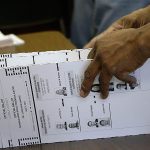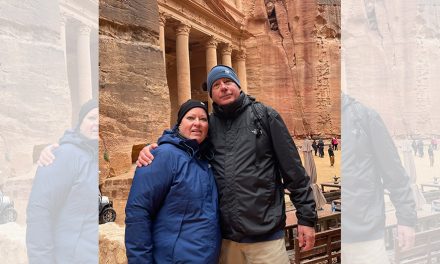
Shelly’s last blunder surprises Begaye

By Duane A.Beyal
Special to the Times
As the alien spaceship approached Earth, one says to another, “They communicate through things called words and use each other with papers that they sign.”
These papers, the alien says, usually promise one side certain enrichments like food and water, hay and feed, education and health care, freedom and self-sufficiency.
Since humans first walked the planet, the alien says, some sort of agreement was reached between groups to stop war or divide up land or whatever else was being disputed.
What’s interesting, the alien continued, is that it is rare for these agreements to be kept or honored by those who signed them.
So these deceptive papers are passed around among groups of humans with the purpose of deceiving one side? The head alien asked.
Yes, said his assistant, they lie to get what they want.
For Native Americans, these papers were called treaties.
While almost all the treaties signed between tribes and the Spanish, Mexicans and the newly arrived Europeans contained promises and sparkling language, they did not live long enough for the ink to dry.
Native American history is full of treaties made and broken by the other side.
The Navajos’ Treaty of 1868 is still held in high esteem, however, because it ended war with the United States, allowed the survivors of Ft.
Sumner to return home, gave us a portion of our original homelands, stated that education would be provided to our children, and that “bad men” would be prosecuted.
In general, treaties and federal law led to the establishment of the trust responsibility on the part of the U.S.
towards Native American people and created the Bureau of Indian Affairs and the Indian Health Service.
We can vote in city, county, state and federal elections as well as in the elections for Navajo Nation leaders.
But these treaty rights and the special status conferred upon Native Americans are always in the gun sights of those who oppose them.
I recall a national conference in 1990 of county officials where a major topic was to get rid of the treaties the U.S.
had signed with tribes.
These efforts never stop despite being upheld by rulings of the U.S. Supreme Court and federal laws enacted since then.
These signed documents can be both good and bad.
The struggle continues.
So outgoing President Ben Shelly brought a surprise to the May 12 inauguration of President Russell Begaye and Vice President Jonathan Nez.
He brought his own paper that needed to be signed.
The paper ostensibly made the signers, Shelly and Begaye, agree that the new president would continue working on the projects listed, which Shelly’s administration had been working on.
Billed as a show of cooperation, Shelly presented it to Begaye in front of the crowd.
Begaye signed it.
After taking the oath of office, Begaye and Nez left to enjoy the festivities.
Meanwhile, social media erupted with astonished opponents of the Escalade, a proposed project at the Confluence where the Colorado River and the Little Colorado River join.
Begaye had signed the document that listed a tramway, hotel and restaurant that would be built at the Confluence as one of the projects he would carry on to completion.
President Begaye quickly issued a press release to “clarify” his position, stating that he has never supported the Escalade project.
In fact, he never discussed the Escalade with Shelly.
Although two or three of the listed projects were good, such as studies of a railroad spur at Thoreau, N.M.
, he had never agreed to the project at the Confluence.
In front of the crowd and the cameras, Shelly tricked Begaye into signing this paper.
Shelly, known for clumsy actions and words during his term in office, went out with another blunder.
But what does this say about President Begaye? Will he sign any paper placed in front of him?
Signing the paper offered by Shelly is a rookie mistake.
He should have accepted the paper, said he’d like to look it over, and put it in his pocket.
Hopefully, the new president will exercise due diligence when confronted with papers to sign in the future.
Come to think of it, with a little makeup and a costume, Shelly would fit in with the crowd at the Star Wars bar, which brings us back to the aliens.
OK, thought the lead alien, we’ll take a paper to the humans and promise them anything they want and have their leaders sign it.
Then we’ll empty the oceans and take whatever other resources we need.
Then we’ll disappear into space.








 Highway 264,
Highway 264, I-40, WB @ Winslow
I-40, WB @ Winslow